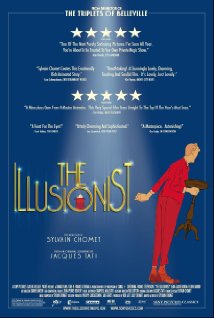
As with many of the animated films we watch, this one was added to our watch list by my wife. It’s a French-Scottish production directed by Slyvain Chomet who is best known for Les Triplettes de Belleville. It’s also worth noting from the onset it’s based on a script by French comedian and film maker Jacques Tati from the 1950s about his relationship with his daughter, but it was never actually made into a film.
The illusionist of the title refers to an aging stage magician named, according to the poster of his show, Tatischeff. Though originally from Paris, he is forced to travel to smaller and less prestigious venues as his audience dwindles, drawn instead to the new fad of rock music in the late 1950s. He eventually finds himself in a small village in Scotland which is isolated enough to appreciate his performances for a time. There he befriends a naive young girl who believes that he can do real magic. Despite their lack of a mutual language, she decides to leave her home and travel with him.
Drawn in a simple and yet impressively detailed style, this is another animated feature which visually unique and beautiful. Its visuals of the cities and towns the magician moves through is especially impressive. Edinburgh in particular looks so alive that you feel you’re walking down its streets yourself. Since it has almost no dialogue, its visuals carry the entire story almost entirely on their own, with the body language of the characters conveying what they feel and what they think.
Story-wise, this is a melancholic film, so much so that it can be uncomfortable to watch. Any illusions that you might have that this is a film about magical wonder is shattered as soon as you see the poor magician stoically and professionally carry out his trade to near empty halls and indifferent audiences. It’s not just him either as he shares common cause with numerous other entertainers of yore whose time has passed: clowns, trapeze artists, ventriloquists. When he meets the girl, apparently named Alice, you think perhaps that there is a ray of sunshine there, and there is for one brief moment. But as their relationship develops, things actually get even more depressing as we realize how hopelessly naive Alice is and how much pain the magician must endure to preserve her innocence.
What makes the situation so painful to watch is that no one is really in the wrong here. The girl is naive but then she is a child who has never left her little village and knows little of the world outside it. As for the magician, faced constantly with a world that has long grown bored of magic, the temptation to indulge a child’s sense of wonder must be strong indeed. As my wife notes, you keep waiting on the edge of your seat for the shoe to drop and for things blow up. One of my main disappointments is that the film effectively sidesteps the climax that the everyone naturally expects is coming rather than allow it to play out. By stepping back from the brink, the film reveals itself as being less mature and interesting than it could be.
That this was originally written by Tati is apparently a source of controversy with questions not only over the lack of a direct mention of the daughter involved but also over whether or not this is a work worthy of what Tati intended. For my part, I only say that it is understandable why Tati never filmed it himself. It strikes me as an incredibly uncharitable view of a father about his relationship with his own daughter, given his own prolonged absence from her life due to his dedication to his own career. It’s also a very one-sided view. Since the girl is never allowed to lose her innocence, she is also never allowed to change and therefore fully develop into a real character.
Whatever the real story behind it is, I can’t deny that this is a unique and emotive work that is well worth watching. Yet in failing to be as radical as it should rightfully be, to take its premise as far as it needs to go, it falls short of being a great film.
One thought on “L’Illusioniste (2010)”